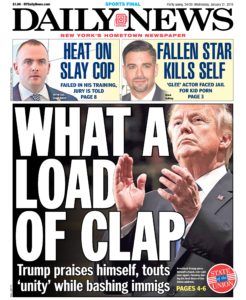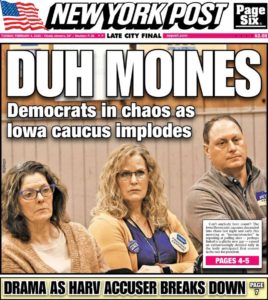Donald J Trump’s procession to the podium last night was slow, as he stopped to take plaudits from members of congress who had waited for hours to sit on the edges of the rows in order to whisper words of praise in their leader’s ear. One of them even had dollar bills poking out of his breast pocket, like some kind of caricature used car salesman in a local TV ad. But when Trump finally strode onto the dais at the front of the House chamber, to chants of “four more years, ” he was a man who knew his trifecta had come up.
* First, his own overwhelming victory in Monday’s Iowa GOP caucus had been unexpectedly augmented by the Democrats’ display of incompetence as the opening instalment of their nominating process spectacularly imploded.
* Second, Gallup had announced earlier that his approval rating had hit 49 per cent: a personal best, driven by a growing popularity among independents, and with 63 per cent of Americans now approving of his handling of the economy.
* And third, he knows that later on Wednesday, the Senate is poised to acquit him in the all-too predictable end to his impeachment trial.
Standing in front of Speaker of the House Nancy Pelosi, whose hand he did not shake, he looked out at the Republican members of congress who took every opportunity to leap to their feet with applause as the president listed what he saw as his accomplishments as part of what he called the “great American comeback”.
Touting successes in the economy and road-testing a campaign slogan by hailing a “blue collar boom” there were very specific overtures aimed at African-Americans, set to be a key constituency in the months ahead. NPR’s Ayesha Rasco wrote that: “Experts say they don’t think Trump’s support [with black voters] is likely to go much higher than the 8 per cent he got in 2016, but a small increase in key swing states could make a difference.”
 While many State of the Union addresses are in one way or another a call to action around some national cause or goal, this was more of a campaign kick-off rally. Eugene Robinson at the Washington Post wrote that the president used the speech to “trumpet his own primacy.”
While many State of the Union addresses are in one way or another a call to action around some national cause or goal, this was more of a campaign kick-off rally. Eugene Robinson at the Washington Post wrote that the president used the speech to “trumpet his own primacy.”
“Trump took credit for anything positive that has taken place during his time in office, while blaming “the previous administration” for anything negative. He praised himself for slashing the unemployment rate, which happened mostly under President Barack Obama. He took credit for making the United States the world’s leading producer of oil and natural gas, which also happened under Obama. He pledged that his administration will always guarantee health insurance for those with preexisting conditions, though his administration has been in court trying to strike down the law providing that very guarantee.”
There was not a word about climate change, but plenty of talk about “energy dominance”; some dramatic rhetoric about undocumented immigrants, but nothing about mass shootings or gun violence. Fred Guttenberg, whose daughter was killed in the Parkland shooting, was escorted out after shouting from the public gallery.
When Trump spoke about wanting to lower prescription drug prices, Democrats interrupted by chanting “HR3” referring to a House bill that does just that and is languishing in the Senate.
This was the State of the Union as part political rally, part daytime TV shock show. Sometimes it seemed that all that was missing was the result of a backstage paternity test.
There were sympathetic figures and effective props in the president’s choice of gallery guests – perhaps the most powerful was the appearance of a 100-year-old Tuskegee airman and his great-grandson, while there was also an emotional military family reunion. But then there was probably the most controversial moment of the evening, with the award of the Presidential Medal of Freedom – the nation’s highest civilian honour – to one of America’s most divisive figures, radio host Rush Limbaugh.
The 78-minute speech was, as expected, deeply partisan with undertones of bitterness; perhaps more reminiscent in tone of Trump’s inauguration address than his first State of the Union two years ago.
As the president concluded his remarks, Speaker Pelosi had the last word – or the last visual – by pointedly ripping up the sheets of the prepared text, later calling it a “manifesto of mistruths,” which of course sparked a social media blizzard of both condemnation and support, a further indication of exactly how polarized the nation is heading into what is sure to be an ill-tempered election.
But if there is one thing this president and his speechwriters know, it’s how to message the moment, and he used the opportunity to effectively signal how he sees next phase of his presidency unfolding. The playbook is not particularly different from the one he used in 2016, and for Democrats – whoever their nominee turns out to be – last night’s speech laid out the roadmap they will have to counter in the coming months.
*The full text of the speech, fact-checked and annotated by NPR, is here. From the New York Times here, the Washington Post here, and Politico here.
Boasts, barbs and a ripped up speech
ICYMI: SOTU in 5 minutes pic.twitter.com/PUTHGCUHKf
— Zach Purser Brown (@zachjourno) February 5, 2020
The start may be the end for Iowa
Mayor Pete Buttigieg, in his desire to claim victory on Monday night, as the nation watched and waited for some inkling of an actual outcome, said: “Iowa, you have shocked the nation.”
Well, that was certainly true.
Even if Buttigieg hadn’t actually won, he won the after-party by getting out of Iowa and flying to New Hampshire, doing all the morning shows and behaving like a victor. While it was still not sure who had won, it was painfully obvious who had lost – the Democratic party, as well as anyone in the country desperately hoping to get behind a competent, well-organized opposition.
 As the evening wore on, it was increasingly hard to believe how technical glitches could turn the state’s first-in-the-nation caucuses into more of a fiasco. It’s not like they weren’t warned. But inevitably the Democrats ended up with a veneer of incompetence that might be hard to shake off. And the fallout could even lead to the end of Iowa’s coveted position at the head of the line for choosing a presidential candidate. The most important thing is confidence in the system and confidence in the outcome, so it was hardly surprising that Nate Silver would suggest that Iowa may have “screwed up the whole nomination process.”
As the evening wore on, it was increasingly hard to believe how technical glitches could turn the state’s first-in-the-nation caucuses into more of a fiasco. It’s not like they weren’t warned. But inevitably the Democrats ended up with a veneer of incompetence that might be hard to shake off. And the fallout could even lead to the end of Iowa’s coveted position at the head of the line for choosing a presidential candidate. The most important thing is confidence in the system and confidence in the outcome, so it was hardly surprising that Nate Silver would suggest that Iowa may have “screwed up the whole nomination process.”
That depends on how quickly the party, the candidates and the media are all able to move on. On Tuesday, as the State of the Union was taking place, partial results began to be released, which showed Buttigieg and Sen. Bernie Sanders ahead but, crucially, former Vice-President Joe Biden running well behind. Elizabeth Bruenig writes at the New York Times that the party “is on track for an explosive showdown between the party’s left wing and its establishment center.”
Buttigieg and Sanders continue lead in partial results, now with 71% of precincts reporting.
Follow live Iowa results: https://t.co/qKiPcutHdy pic.twitter.com/gY9VzGNLDt
— The Washington Post (@washingtonpost) February 5, 2020
The whole day was undoubtedly a gift to the Trump camp, but even as the president reveled in Democratic dysfunction a video emerged of him during the national anthem at his Super Bowl party at Mar-a-Lago. If it created even a brief glimpse of who the president really is, like so many other things, it likely won’t matter.
His other Super Bowl error, meanwhile, over the location of Kansas City, is also something of a throwaway, but reinforces a worrying institutional trend. He knows the power of his words and tweets to move markets or provoke a global crisis. If he never checks them for accuracy, he never apologises when he gets something wrong. And his loyal supporters can be relied upon to rally behind him, negating – or at least obfuscating – any criticism. It is a powerful weapon to have at your disposal heading into a contentious election campaign.
After the president’s trial ends later today – with the GOP keen to tout a bipartisan acquittal if even one Democrat crosses the floor – and however the Republican Senators might ultimately justify their decision, some observers believe we will see Trump “unleashed” with the realization that he will likely face no consequences for anything that might emerge between now and the election. According to Gabriel Sherman at Vanity Fair: “It’s payback time,” a prominent Republican told me last week. “He has an enemies list that is growing by the day.” Top of the list, apparently, are John Bolton, Adam Schiff, Jerry Nadler and Mitt Romney.
Greg Sargent writes at the Washington Post that Trump is “about to get a lot more dangerous” and what Democrats could – and should – do about it. Like during his 2016 election campaign, the president is also expected to take fresh aim at the media, again riling up his base with little fear of consequences.
For now, though, the Democrats’ immediate challenge is to put Iowa behind them and move on to setting out their respective visions in New Hampshire, with a debate on Friday ahead of next week’s primary.
The opposition party have now come at the president twice and missed – with the Mueller report and the two articles of impeachment – and while many can argue those attempts at restraining his power were necessary, the coming months until November’s election will play out against that backdrop. Intraparty division is something they can ill afford.
